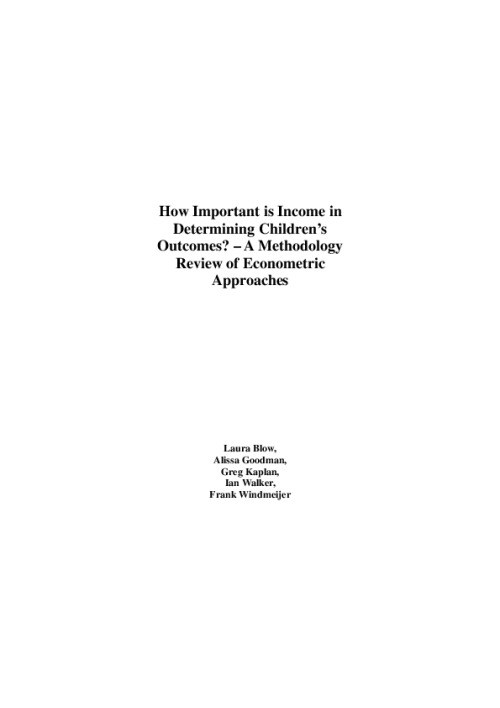Downloads

methodology.pdf
PDF | 327.79 KB
This document reviews a number of empirical methodologies available to researchers for answering these important policy questions. For each methodology we set out the intuition behind the method, and an example of where it has been used effectively to answer a relevant policy question. We restrict ourselves to methodologies found within the econometric literature.
Authors

Laura Blow

Research Fellow University College London
Alissa is an IFS Research Fellow and a Professor of Economics and Director of the Centre for Longitudinal Studies at the UCL Institute of Education.

Research Fellow University of Chicago
Greg is a Professor at the University of Chicago in the Kenneth C. Griffin Department of Economics and a Research Fellow at the IFS.

Ian Walker

Research Fellow University of Bristol
Report details
- Publisher
- IFS
Suggested citation
Blow, L et al. (2005). How important is income in determining children's outcomes? A methodology review of econometric approaches. London: IFS. Available at: https://ifs.org.uk/publications/how-important-income-determining-childrens-outcomes-methodology-review-econometric (accessed: 10 May 2024).
More from IFS
Understand this issue

Sure Start achieved its aims, then we threw it away
15 April 2024

Social mobility and wealth
12 December 2023

How important is the Bank of Mum and Dad?
15 December 2023
Policy analysis

Living standards since the last election
21 March 2024

Major challenges for education in Wales
21 March 2024

Sliding education results and high inequalities should prompt big rethink in Welsh education policy
21 March 2024
Academic research

Police infrastructure, police performance, and crime: Evidence from austerity cuts
24 April 2024

Labour market inequality and the changing life cycle profile of male and female wages
15 April 2024

There and back again: women’s marginal commuting costs
2 April 2024